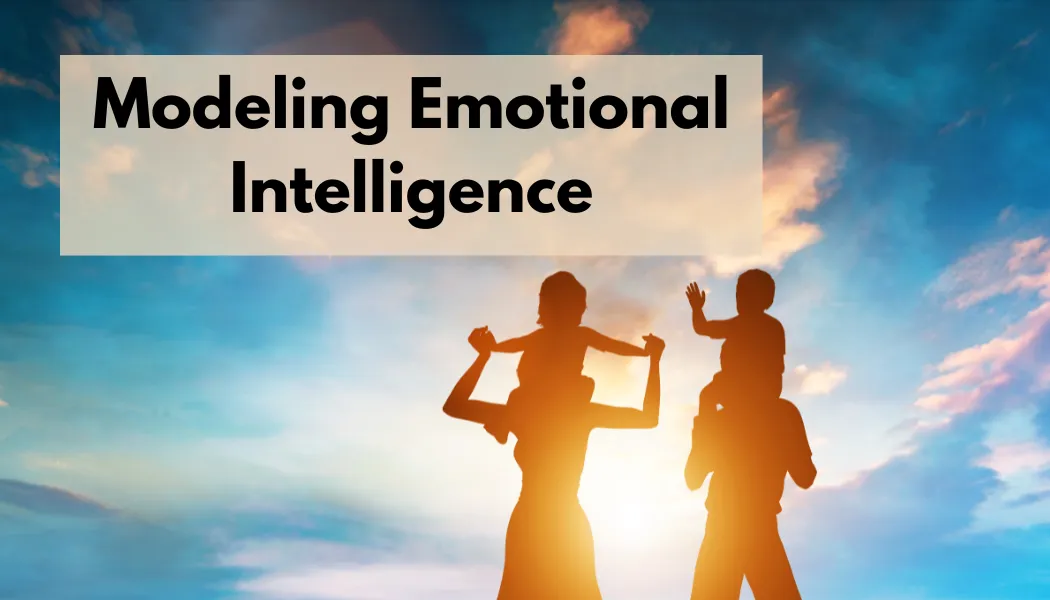Modeling Emotional Intelligence: How Mindful Parenting Helps Children Manage Emotions
Introduction: The Crucial Role of Emotional Intelligence Emotional intelligence (EI) has become a key predictor of life success, happiness, and healthy relationships. While traditional education focuses on academics and skills, EI emphasizes understanding and managing emotions—both our own and those of others. Children with strong EI are better equipped to navigate challenges, build resilience, and foster meaningful connections.
Introduction: The Crucial Role of Emotional Intelligence
Emotional intelligence (EI) has become a key predictor of life success, happiness, and healthy relationships. While traditional education focuses on academics and skills, EI emphasizes understanding and managing emotions—both our own and those of others. Children with strong EI are better equipped to navigate challenges, build resilience, and foster meaningful connections.
Parents are the first role models for emotional intelligence. The way a parent responds to stress, frustration, or joy shapes how a child interprets emotions and develops coping strategies. Mindful parenting—being present, aware, and intentional in interactions—provides children with a living model for managing emotions effectively.
This article explores the deep connection between mindful parenting and emotional intelligence, providing practical strategies, real-life examples, research insights, and guidance for parents at every stage.
Understanding Emotional Intelligence
What Emotional Intelligence Entails
Emotional intelligence includes:
- Self-Awareness: Recognizing personal emotions and their effects on thoughts and behavior.
- Self-Regulation: Managing impulses, controlling reactions, and staying calm under pressure.
- Motivation: Pursuing goals with persistence and resilience.
- Empathy: Understanding and relating to others’ feelings.
- Social Skills: Building and maintaining positive relationships, resolving conflicts, and communicating effectively.
The Lifelong Importance of EI
Research shows that children with higher EI:
- Perform better academically due to improved focus and problem-solving
- Exhibit stronger social skills and peer relationships
- Experience lower levels of stress and anxiety
- Demonstrate greater adaptability and resilience
The foundation of EI begins in early childhood, making mindful parenting a critical factor in its development.
What is Mindful Parenting?
Mindful parenting is the practice of bringing intentional attention and awareness to parent-child interactions. Unlike reactive or habitual parenting, it emphasizes:
- Presence: Giving full attention to your child in each moment
- Non-Judgment: Observing behaviors without labeling them as “good” or “bad”
- Compassion: Responding empathetically to emotional needs
- Intentionality: Acting thoughtfully instead of reacting automatically
Mindful parenting encourages parents to notice their own emotional triggers, manage stress, and create a calm, supportive environment that nurtures emotional intelligence.
The Science Behind Mindful Parenting and EI
Studies indicate that children learn emotional skills primarily through observational learning:
- Mirror Neurons: These brain cells activate when observing someone else’s actions, helping children imitate emotional regulation behaviors.
- Stress Contagion: Children can absorb stress or calmness from parents, making mindful modeling essential.
- Attachment Theory: Secure attachment formed through attentive, responsive parenting fosters emotional competence.
Mindful parenting directly influences neural pathways associated with emotional regulation, empathy, and resilience.
Benefits of Mindful Parenting for Children
1. Enhanced Emotional Regulation
- Children learn to identify, label, and manage feelings
- Reduced tantrums, outbursts, and reactive behaviors
2. Increased Empathy and Compassion
- Observing mindful and empathetic responses encourages children to understand others
- Fosters cooperation and prosocial behavior
3. Stronger Parent-Child Bond
- Mindful presence nurtures trust, security, and open communication
4. Better Academic and Social Outcomes
- Improved focus, problem-solving, and conflict resolution
- Reduced school-related stress and anxiety
5. Lifelong Resilience
- Exposure to mindful problem-solving equips children to handle setbacks and challenges
Practical Strategies for Mindful Parenting
1. Pause and Reflect Before Reacting
- Take a deep breath and assess the child’s perspective
- Respond calmly rather than with frustration
Example: When a child spills juice, pause to acknowledge their feelings instead of immediately scolding.
2. Active Listening
- Make eye contact and fully attend to the child
- Reflect back what you hear to validate emotions
Example: “I hear that you’re upset because your toy broke.”
3. Emotion Naming and Labeling
- Help children identify their emotions
- Encourage them to articulate feelings verbally
Example: “It seems like you’re feeling frustrated that homework is hard.”
4. Modeling Calm Behavior
- Demonstrate healthy coping strategies like deep breathing or counting to ten
Example: During a stressful situation, narrate your process: “I feel frustrated, so I’m taking three deep breaths to calm down.”
5. Mindful Play
- Engage fully during play without distractions
- Observe and respond thoughtfully
Example: Play a board game together, focusing on interaction rather than winning.
6. Reflection and Discussion
- After conflicts or emotional events, talk through emotions and solutions
Example: Discuss how to handle arguments with friends at school, modeling constructive problem-solving.
7. Gratitude and Compassion Practices
- Encourage noticing and expressing appreciation
- Model acts of kindness and reflection
Example: Share moments of gratitude before bedtime or during family meals.
mindfulness-techniques-to-foster-emotional-intelligence”>Mindfulness Techniques to Foster Emotional Intelligence
Breathing Exercises for Children
- Teach simple techniques like “breathe in for four counts, hold for two, exhale for six”
- Helps children calm down during frustration or anxiety
Body Awareness
- Connect emotions to physical sensations: tight fists, racing heart, tense shoulders
- Promotes self-awareness and regulation
Journaling and Creative Expression
- Older children can draw or write about their feelings
- Enhances reflection and emotional articulation
Role-Playing and Perspective-Taking
- Practice empathy and problem-solving by switching roles
- Encourages understanding of others’ emotions and viewpoints
Mindful Parenting Across Developmental Stages
Infants
- Respond empathetically to cries and cues
- Use touch, eye contact, and soothing voices to nurture attachment
Toddlers
- Model patience during tantrums
- Encourage naming emotions and gentle guidance
School-Age Children
- Discuss emotions, friendships, and challenges
- Practice problem-solving and coping strategies together
Adolescents
- Encourage reflective dialogue and independence
- Model calm responses and intentional decision-making
Overcoming Common Challenges
- Time Constraints: Use micro-moments like bedtime or car rides for mindful interactions
- Parental Stress: Practice self-care and mindfulness for emotional availability
- Consistency: Start small and gradually build mindful habits
- Emotional Triggers: Notice your own reactions and pause before responding
Tip: Mindful parenting is a lifelong journey, not about perfection. Every intentional act matters.
Long-Term Impact of Mindful Parenting
- Emotionally Intelligent Children: Better empathy, self-awareness, and emotional regulation
- Stronger Family Bonds: Trust, understanding, and open communication
- Better Mental Health: Reduced stress, anxiety, and emotional dysregulation
- Resilient and Adaptable Children: Equipped to handle setbacks and challenges
- Enhanced Social Competence: Improved relationships and collaborative skills
Real-Life Stories and Examples
Example 1: A father notices his child becoming anxious before a school presentation. Instead of dismissing the worry, he practices mindful breathing with his child, helping them calm down and approach the situation confidently.
Example 2: During a sibling disagreement, a mother pauses to name emotions, guides problem-solving, and models empathy, teaching children constructive conflict resolution skills.
Mindful Parenting for Modern Challenges
- Screen Time Management: Encourage presence over digital distraction
- High-Stress Environments: Model calm responses to work or societal pressures
- Cultural and Social Expectations: Focus on emotional understanding rather than perfectionism
- Remote Learning and Virtual Socialization: Guide children to balance emotions with online interactions
Integrating Mindful Parenting into Daily Life
- Morning Rituals: Set an intention for patience and presence
- Daily Check-Ins: Short conversations to explore feelings and emotions
- Mindful Transitions: Pause before leaving home or starting homework
- Evening Reflection: Discuss daily emotional experiences and coping strategies
- Consistent Modeling: Practice calm, empathy, and reflection in your own behavior
Conclusion: Raising Emotionally Intelligent Children
Modeling emotional intelligence through mindful parenting equips children with the tools to understand, manage, and respond to emotions. By being present, compassionate, and intentional, parents create an environment where children can thrive emotionally, socially, and academically.
Even small daily practices—like pausing before reacting, actively listening, naming emotions, and demonstrating calm—have a cumulative effect, nurturing lifelong emotional competence and resilience. Mindful parenting is a gift of awareness and connection, preparing children to navigate life with confidence, empathy, and emotional balance.
Nurture Emotional Awareness, Calm, and Connection in Your Family
If this article helped you understand how mindful parenting shapes emotionally resilient children, here are a few more supportive reads that deepen emotional intelligence, strengthen bonds, and bring more peace into daily life:
- How Mindful Communication Enhances Relationships – Learn how presence and awareness can transform the way you listen, connect, and respond.
- Building Emotional Resilience Through Mindfulness – Explore practical tools to help you and your child stay grounded during emotional challenges.
- Awareness After Anger: How Mindfulness Helps You Recover – A gentle guide to understanding emotions, calming reactivity, and returning to compassion.
Want Daily Inspiration to Support a More Patient, Present Parenting Journey?
Encouraging Words — A heartwarming collection of short, uplifting reminders to help you stay grounded, kind, and emotionally steady each day.
The Positivity Collective
The Positivity Collective is a dedicated group of curators and seekers committed to the art of evidence-based optimism. We believe that perspective is a skill, and our mission is to filter through the noise to bring you the most empowering wisdom for a vibrant life. While we are not clinical professionals, we are lifelong students of human growth, devoted to building this sanctuary for the world.










